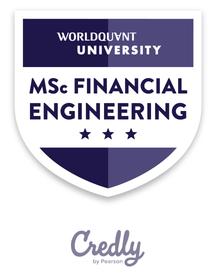MSc in Financial Engineering
Learn How to ApplyOur MScFE offering is where programming and data science meet the future of finance.
- Completely Online
- 100% Free of Cost
- Rigorous Focus on Applied Learning

Interest in Financial Engineering is on the rise as innovation across the globe drives demand for analytics and data science training.
From evaluating statistics to econometric modeling, WQU educators teach advanced skills that can be applied to most industries. Graduates are prepared for sought-after positions in securities, banking, and financial management and can also apply their skills at general manufacturing and service firms including consultancies, insurance companies and more, as quantitative analysts. Building on this foundation, the comprehensive Program also provides students with the skills needed to succeed in presenting ideas and concepts in a professional business setting. Applicants who complete the University’s application requirements can complete their MSCFE entirely free of cost.
Learn more about the field of Financial Engineering in this post.
Master of Science in Financial Engineering
June 25, 2024
July 2, 2024
Entirely Free
Two Years
- Bachelor’s Degree
- Proof of English proficiency
- Passing score on Quantitative Proficiency Test (75% or higher)
20-25 Hours a Week
- Master of Science in Financial Engineering Degree
- Sharable Credly Certification
“My lifelong dream of being in the FinTech or Accounting industry is moving forward thanks to generous educational resources like yours. Since graduating from WorldQuant University tuition-free, my dream has taken the first step to becoming a reality.”
What You Will Learn
Designed by industry experts, WorldQuant University’s accredited Program integrates mathematical, statistical, and computer science tools with finance theory and professional business skills in a completely online and collaborative setting. Graduates are positioned to excel in today’s highly collaborative, fast-paced, professional environments.
The two-year Program consists of nine graduate-level courses and a Capstone Course during which students complete a culminating project. The courses are sequentially taught and build on one another. Taking one course at a time allows you to earn your degree without disrupting your life. All students accepted into the MScFE Program will complete the Program free of cost.
All courses are delivered in an online group setting and focus on applied projects.
Along with their diploma, students who successfully complete the MSc in Financial Engineering Program receive a sharable, verified version of their WQU degree issued by Credly.

Why Free?
WQU offerings are completely free for prospective students who successfully complete the Program application and entrance requirements as a commitment to the belief that talent is equally distributed globally, but opportunity is not. This allows qualified, admitted students to build their skills and advance their careers within a supportive global community, without the common barrier of financial commitments.
Course Descriptions
The MSc in Financial Engineering Program comprises nine graduate-level courses and a culminating Capstone course. Students take one course at a time in a prescribed sequence.
There is a two-week break between courses: one week for the grading process and one week for subsequent course registration.
In this pilot course for the MScFE Program, students are introduced to the world of professional finance: markets, products, participants, and regulation.
The activities within financial markets will be discussed, including trading, financing, brokering, pricing, hedging, optimizing, and managing risk. Throughout the course, students identify a list of significant factors that affect the financial industry. Students will be able to interact with web apps that illustrate these concepts. Understanding the asset classes, activities, and influential aspects of the financial landscape will provide a solid foundation on which students will build mathematical and computational tools to develop models for financial engineering. No background in finance is required.
Program Outcomes
Computational Skills
Build proficiency with Python modules, data structures, and machine learning algorithms as applied to financial engineering.
Mathematical Skills
Apply probability, linear algebra, and stochastic calculus techniques to solve pricing, hedging, prediction, and optimization problems.
Statistical Skills
Build hands-on skills summarizing and modeling structured and unstructured financial data and using the data for modeling in econometrics, machine learning, and deep learning.
Financial Skills
Develop a quantitative and computational toolkit of methodologies to address financial challenges of credit risk, volatility, liquidity, leverage, regulation, and model breakdown with ethical principles in mind.
Collaborative & Critical Thinking Skills
Analyze and solve financial problems by engaging in practitioner-oriented group work assignments and project-oriented problems, applying collaborative and critical thinking skills.
Communication Skills
Create clear and concise technical and non-technical reports that explain and interpret model results and recommend courses of action using various physical and digital media.

How can I use my degree?
Financial engineers pursue professional roles such as quantitative researchers, quantitative developers, quantitative traders, algorithmic traders, and portfolio managers for financial institutions and in related service industries.
Many WQU graduates focus on public policy, working for governments, developing state and federal financial policies, or conducting research at think tanks. Others focus on industries such as agriculture, healthcare, and emerging technology.
There is tremendous fluidity between different financial engineering careers and transferable skills that allow professionals to move between these opportunities easily.
Learn more about the field of Financial Engineering in this post.
Frequently Asked Questions
What is Financial Engineering?
Financial Engineering is a field where mathematical techniques are used to solve financial problems. It is an interdisciplinary specialty that leverages skills and tools from computer science, statistics, economics, and applied mathematics, enabling practitioners to address financial challenges and opportunities, and in some cases, develop new products and services. As more businesses and organizations become data-driven, there are growing opportunities for financial engineers outside of the financial industry, including healthcare, the supply chain, agriculture, and more.
For a more detailed breakdown of how this field emerged, what it takes to become a financial engineer, and what kinds of jobs financial engineering graduates pursue, head over to the WQU blog and check out the Guide to Financial Engineering.
How can I prepare for the Quantitative Proficiency Test?
The Quantitative Proficiency Test consists of 60 questions covering advanced algebra, linear algebra, differential calculus, integral calculus, differential equations, discrete mathematics, probability, and statistics. A portion of the test is dedicated to measuring fundamental knowledge of Python programming and Python data structures. Make sure you prepare thoroughly for the test and for the successful completion of the Program. You can find a document with sample questions here. Use this list of (free!) online resources to strengthen your mathematical, statistical, and programming skills.
The minimum passing grade for the test is 75%. It must be completed in one sitting with up to a total of two (2) hours to finish. You have a maximum of two (2) attempts to complete the test.
How can I use my MSc in Financial Engineering?
Financial engineers pursue professional roles such as quantitative researchers, quantitative developers, quantitative traders, algorithmic traders, and portfolio managers for financial institutions. Some focus on public policy, working for governments developing state and federal financial policies, or conducting research at think tanks. There is a tremendous amount of fluidity between different financial-engineering careers, as well as transferable skills that allow professionals to easily move between these opportunities.

